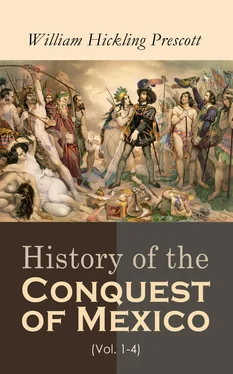It was with much regret, therefore, that his master received the proposals for his return to his countrymen, to which nothing but the rich treasure of glass beads, hawk-bells, and other jewels of like value, sent for his ransom, would have induced him to consent. When Aguilar reached the coast, there had been so much delay that the brigantines had sailed; and it was owing to the fortunate return of the fleet to Cozumel that he was enabled to join it.
On appearing before Cortés, the poor man saluted him in the Indian style, by touching the earth with his hand and carrying it to his head. The commander, raising him up, affectionately embraced him, covering him at the same time with his own cloak, as Aguilar was simply clad in the habiliments of the country, somewhat too scanty for a European eye. It was long, indeed, before the tastes which he had acquired in the freedom of the forest could be reconciled to the constraints either of dress or manners imposed by the artificial forms of civilization. Aguilar’s long residence in the country had familiarized him with the Mayan dialects of Yucatan, and, as he gradually revived his Castilian, he became of essential importance as an interpreter. Cortés saw the advantage of this from the first, but he could not fully estimate all the consequences that were to flow from it. [542]
The repairs of the vessels being at length completed, the Spanish commander once more took leave of the friendly natives of Cozumel, and set sail on the fourth of March. Keeping as near as possible to the coast of Yucatan, he doubled Cape Catoche, and with flowing sheets swept down the broad bay of Campeachy, fringed with the rich dye-woods which have since furnished so important an article of commerce to Europe. He passed Potonchan, where Cordova had experienced a rough reception from the natives; and soon after reached the mouth of the Rio de Tabasco , or Grijalva , in which that navigator had carried on so lucrative a traffic. Though mindful of the great object of his voyage,—the visit to the Aztec territories,—he was desirous of acquainting himself with the resources of this country, and determined to ascend the river and visit the great town on its borders.
The water was so shallow, from the accumulation of sand at the mouth of the stream, that the general was obliged to leave the ships at anchor and to embark in the boats with a part only of his forces. The banks were thickly studded with mangrove-trees, that, with their roots shooting up and interlacing one another, formed a kind of impervious screen or net-work, behind which the dark forms of the natives were seen glancing to and fro with the most menacing looks and gestures. Cortés, much surprised at these unfriendly demonstrations, so unlike what he had had reason to expect, moved cautiously up the stream. When he had reached an open place, where a large number of Indians were assembled, he asked, through his interpreter, leave to land, explaining at the same time his amicable intentions. But the Indians, brandishing their weapons, answered only with gestures of angry defiance. Though much chagrined, Cortés thought it best not to urge the matter further that evening, but withdrew to a neighboring island, where he disembarked his troops, resolved to effect a landing on the following morning.
When day broke, the Spaniards saw the opposite banks lined with a much more numerous array than on the preceding evening, while the canoes along the shore were filled with bands of armed warriors. Cortés now made his preparations for the attack. He first landed a detachment of a hundred men under Alonso de Avila, at a point somewhat lower down the stream, sheltered by a thick grove of palms, from which a road, as he knew, led to the town of Tabasco, giving orders to his officer to march at once on the place, while he himself advanced to assault it in front. [543]
Then, embarking the remainder of his troops, Cortés crossed the river in face of the enemy; but, before commencing hostilities, that he might “act with entire regard to justice, and in obedience to the instructions of the Royal Council,” [544]he first caused proclamation to be made, through the interpreter, that he desired only a free passage for his men, and that he proposed to revive the friendly relations which had formerly subsisted between his countrymen and the natives. He assured them that if blood were spilt the sin would lie on their heads, and that resistance would be useless, since he was resolved at all hazards to take up his quarters that night in the town of Tabasco. This proclamation, delivered in lofty tone, and duly recorded by the notary, was answered by the Indians—who might possibly have comprehended one word in ten of it—with shouts of defiance and a shower of arrows. [545]
Cortés, having now complied with all the requisitions of a loyal cavalier, and shifted the responsibility from his own shoulders to those of the Royal Council, brought his boats alongside of the Indian canoes. They grappled fiercely together, and both parties were soon in the water, which rose above the girdle. The struggle was not long, though desperate. The superior strength of the Europeans prevailed, and they forced the enemy back to land. Here, however, they were supported by their countrymen, who showered down darts, arrows, and blazing billets of wood on the heads of the invaders. The banks were soft and slippery, and it was with difficulty the soldiers made good their footing. Cortés lost a sandal in the mud, but continued to fight barefoot, with great exposure of his person, as the Indians, who soon singled out the leader, called to one another, “Strike at the chief!”
At length the Spaniards gained the bank, and were able to come into something like order, when they opened a brisk fire from their arquebuses and cross-bows. The enemy, astounded by the roar and flash of the fire-arms, of which they had had no experience, fell back, and retreated behind a breast-work of timber thrown across the way. The Spaniards, hot in the pursuit, soon carried these rude defences, and drove the Tabascans before them towards the town, where they again took shelter behind their palisades.
Meanwhile Avila had arrived from the opposite quarter, and the natives, taken by surprise, made no further attempt at resistance, but abandoned the place to the Christians. They had previously removed their families and effects. Some provisions fell into the hands of the victors, but little gold, “a circumstance,” says Las Casas, “which gave them no particular satisfaction.” [546]It was a very populous place. The houses were mostly of mud; the better sort of stone and lime; affording proofs in the inhabitants of a superior refinement to that found in the Islands, as their stout resistance had given evidence of superior valor. [547]
Cortés, having thus made himself master of the town, took formal possession of it for the crown of Castile. He gave three cuts with his sword on a large ceiba -tree which grew in the place, and proclaimed aloud that he took possession of the city in the name and behalf of the Catholic sovereigns, and would maintain and defend the same with sword and buckler against all who should gainsay it. The same vaunting declaration was also made by the soldiers, and the whole was duly recorded and attested by the notary. This was the usual simple but chivalric form with which the Spanish cavaliers asserted the royal title to the conquered territories in the New World. It was a good title, doubtless, against the claims of any other European potentate.
The general took up his quarters that night in the court-yard of the principal temple. He posted his sentinels, and took all the precautions practised in wars with a civilized foe. Indeed, there was reason for them. A suspicious silence seemed to reign through the place and its neighborhood; and tidings were brought that the interpreter, Melchorejo, had fled, leaving his Spanish dress hanging on a tree. Cortés was disquieted by the desertion of this man, who would not only inform his countrymen of the small number of the Spaniards, but dissipate any illusions that might be entertained of their superior natures.
Читать дальше












